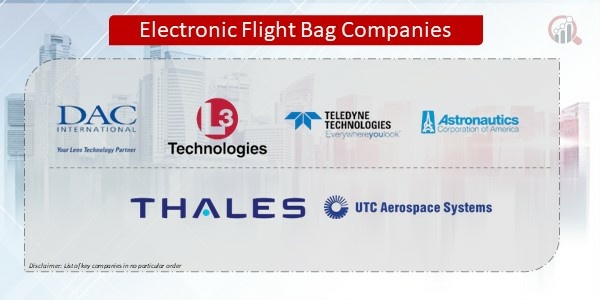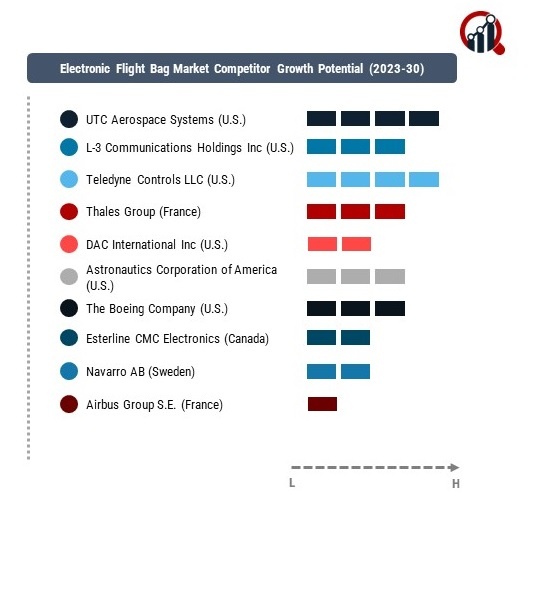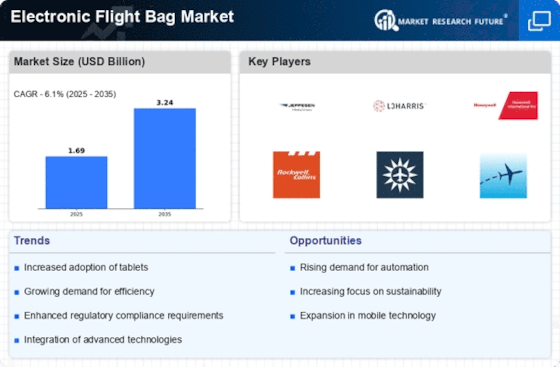Top Industry Leaders in the Electronic Flight Bag Market

Strategies Adopted: In the fiercely competitive EFB market, key players adopt strategic approaches to maintain a competitive edge. A central focus is on continuous research and development (R&D) to enhance EFB capabilities, from navigation and flight planning to document management and connectivity solutions. Strategic partnerships with airlines, aircraft manufacturers, and software developers facilitate collaboration in developing and customizing EFB applications to meet specific operational needs. Additionally, global expansion through acquisitions, alliances, and collaborations ensures a broader market reach, allowing companies to cater to the diverse needs of airlines and aircraft operators worldwide.
Competitive Landscape of Electronic Flight Bag Market
- UTC Aerospace Systems (U.S.)
- L-3 Communications Holdings Inc (U.S.)
- Teledyne Controls LLC (U.S.)
- Thales Group (France)
- DAC International Inc (U.S.)
- Astronautics Corporation of America (U.S.)
- The Boeing Company (U.S.)
- Esterline CMC Electronics (Canada)
- Navarro AB (Sweden)
- Airbus Group S.E. (France)
- Lufthansa Systems (Germany)
- Flightman (Ireland)
- International Flight Support (Denmark)
- Rockwell Collins Inc (U.S.)
Factors for Market Share Analysis: Market share analysis in the EFB market considers various factors crucial to a company's competitive standing. Technical capabilities, such as the ability to offer a comprehensive suite of applications for flight planning, weather updates, electronic charts, and connectivity solutions, play a pivotal role. Companies providing seamless integration with existing avionics systems and adaptability to different aircraft types are better positioned to capture a larger market share. Compliance with aviation regulations, security standards, and the ability to provide secure data connectivity contribute significantly to market share dynamics. Additionally, factors like user interface design, customer support, and cost-effectiveness influence the adoption of EFB solutions and impact a company's market share.
New and Emerging Companies: While established players dominate the market, new and emerging companies contribute to the innovation and evolution of EFB solutions. Companies like ForeFlight and Airline Software are gaining recognition for their specialized EFB applications, often focusing on user-friendly interfaces, advanced features, and cloud-based services. Emerging companies often bring agility and a fresh perspective to the EFB market, introducing novel approaches and technologies that address the evolving needs of modern flight deck operations.
Industry News: Recent industry news in the EFB market underscores ongoing developments and trends shaping the sector. Innovations in EFB applications, such as augmented reality (AR) features for enhanced situational awareness and predictive analytics for fuel efficiency, are gaining prominence. News often covers advancements in connectivity solutions, including the integration of satellite communication and 5G technologies, enabling real-time data exchange between ground and cockpit. Additionally, developments in cybersecurity measures for EFB systems and compliance with the Federal Aviation Administration's (FAA) NextGen initiatives highlight the industry's commitment to safety, efficiency, and compliance. Industry news reflects the dynamic nature of the EFB market, with continuous efforts to enhance capabilities and address the challenges posed by evolving aviation technologies.
Current Company Investment Trends: Investment trends in the EFB market underscore a commitment to technological innovation, cybersecurity, and global reach. Companies are allocating substantial resources to R&D initiatives focused on enhancing EFB applications, integrating artificial intelligence (AI), and ensuring seamless connectivity. Investments in cybersecurity measures, including encryption protocols and secure data transmission, are prioritized to address the increasing digitalization of flight deck operations. Strategic acquisitions of technology startups, partnerships with avionics manufacturers, and collaborations with airlines contribute to a comprehensive approach, ensuring a continuous stream of cutting-edge solutions and maintaining a competitive stance in the market.
Overall Competitive Scenario: The overall competitive scenario in the EFB market reflects a balance between established industry leaders and emerging companies that bring innovation and flexibility to the sector. Established avionics and aerospace companies leverage their extensive experience, global reach, and comprehensive EFB portfolios to set industry standards. Simultaneously, emerging companies contribute to the diversification of EFB solutions, often focusing on specific applications or introducing disruptive technologies. The industry's response to evolving aviation technologies, the demand for increased efficiency, and the growing emphasis on digitalization highlight the adaptability and resilience of EFB providers. As the aviation industry continues to advance, with a focus on digital transformation, sustainability, and connectivity, the EFB market is poised for continued evolution. The emphasis on technological advancements, strategic collaborations, and meeting the dynamic needs of modern flight deck operations positions this market as a critical enabler for the efficiency, safety, and digitalization of cockpit operations worldwide.
Recent Development:
In 2021, Collins Aerospace, a part of Raytheon Technologies, made a strategic move by acquiring FlightAware, reinforcing its connected aviation solutions. This acquisition aimed to enhance real-time flight tracking and predictive technologies within its portfolio. Meanwhile, Honeywell Aerospace launched the IntuVue RXi EFB, a cutting-edge solution featuring advanced head-up display capabilities and integrated weather radar to improve pilot visibility and situational awareness. L3Harris Technologies introduced the Aviator 300 EFB system, emphasizing enhanced cybersecurity features and real-time data feeds to ensure secure and efficient navigation. Boeing, under its Jeppesen division, developed tailored charts for specific avionics systems, optimizing chart presentation and reducing pilot workload. Airbus has focused on open-platform EFB solutions, prioritizing wider compatibility and easier integration with various aircraft systems, showcasing a commitment to technological advancements in the aviation sector.











